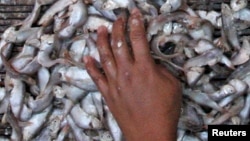A fish farming project set up in Nyamuenda Village in Manicaland province a couple of years ago has become a bedrock of conserving local wetlands while providing nutritious food to 28 households in Nyanga North.
The flourishing project has even attracted unwanted visitors like birds that are feasting on the mouth-watering fish.
It all started with fish worth $400 provided by Zimbabwe’s Environmental Management Agency (EMA) in their quest to preserve local wetlands that play a critical role in purifying the ecosystem.
Attempts to preserve the environment for future generations is now paying dividends as the fish project is flourishing and improving the quality of food in the local community.
Forty seven year-old Tapiwa Charangwa, secretary of the Nyamuenda Wetland Protection and Fish Ponds, says local people are benefiting a lot from the project.
Charangwa says many other people now want to be part of the project as they are seeing the benefits of fish farming.
The abundant fish have attracted unwelcome guests, Fish Monger birds, which she says raid their ponds mainly in summer.
Another member of the fish project, 68-year old Jane Charangwa, says despite this slight setback they are gaining a lot from the fish ponds.
Charangwa believes that this is one of the best ways of empowering communities.
The villagers are breeding Kariba Bream, which is one of the popular dishes in the local community. It also breeds well in some parts of Manicaland region, home of the Nyanga Trout.
EMA Manicaland provincial manager, Kingstone Chitotombe, says they chose the Nyamuenda wetlands as the natural water bodies were under threat from overgrazing and illegal alluvial gold panning.
Chitotombe says the project is a novel way of tackling environmental degradation and balancing people’s diet.
He says EMA is targeting other wetlands in the province with a view of ensuring that they are preserved while providing food to local people.
Some wetlands in cities like Chitungwiza have been degraded through the construction of residential and commercial buildings. According to Chitotombe, a similar fish project would have saved the wetlands.





